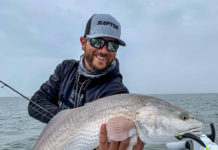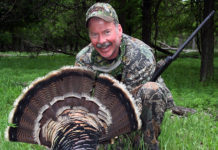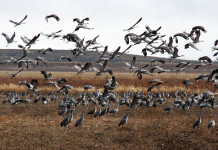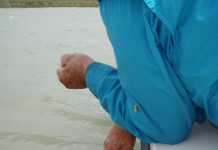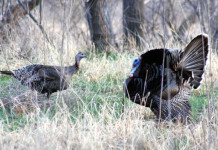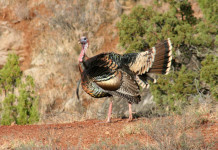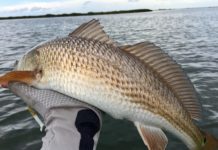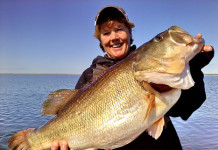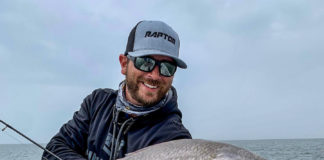The Daily Texas Outdoor Digest is sent to your inbox to keep you up to date about hunting, fishing, conservation and outdoors pursuits making headlines and going viral in the Lone Star State and beyond. It’s free, so subscribe today!
Here’s what’s worth reading today, Wednesday, March 31, 2021:
Texas turkey hunting tactics can swing odds in your favor in spring
Texas speckled trout regulations see big change in Laguna Madre after historic freeze
Hunters need to be held accountable for what they post to social media
We’ve all been there. You’re scrolling through your Facebook or Instagram feed, and you see a negative comment on a hunter’s post. Pretty soon you’re 56 comments deep into the debate, and now you’re invested. Generally, you find yourself taking one side over the other.
I was recently perusing the comment section of a fellow hunter’s social media post. In the video, the bowhunter’s arrow zips right through the guts of the animal as it runs off. It was a shot the hunter should never have taken, yet she took it anyway. Then the hunter began excitedly celebrating the bad shot she’d made, excusing her shot placement to jitters and the fact that the broadhead should do the job.
Now, I do understand that all hunters are bound to make a bad shot eventually. It happens to the most ethical hunters, and it’s a mistake that haunts us into the wee hours of the night, and beyond. But reveling in a bad shot and posting it on social media? That’s a whole other story, and a shameful one. Hunters need to do better when it comes to what we upload to social media and worry less about the five seconds of fame for posting a video to Instagram.
Maybe you think this take is narrow-minded and judgmental, but there’s no way around it: What hunters post on social media does indeed impact the future of hunting.
The 9th Circuit says the right to bear arms does not extend beyond your doorstep
According to the dissent, the appeals court “has decided that the Second Amendment does not mean what it says.”
The U.S. Court of Appeals for the 9th Circuit held that the Second Amendment does not guarantee a right to openly carry firearms for self-defense. Combined with a 2016 decision involving concealed firearms, the ruling means that the Second Amendment does not extend beyond the home for residents of the 9th Circuit, which includes Alaska, Arizona, California, Hawaii, Idaho, Montana, Nevada, Oregon, and Washington.
According to the majority opinion by Judge Jay Bybee, history shows that legal restrictions on carrying unconcealed firearms, including virtual bans like Hawaii’s, are the sort of “longstanding prohibitions” that the Supreme Court has suggested the Second Amendment allows. The four dissenters think history shows nothing of the sort.
“The Second Amendment to the United States Constitution guarantees ‘the right of the people to keep and bear Arms,'” Judge Diarmuid O’Scannlain writes in a blistering dissent joined by Judges Consuelo Callahan, Sandra Ikuta, and Ryan Nelson. “Today, a majority of our court has decided that the Second Amendment does not mean what it says. Instead, the majority holds that while the Second Amendment may guarantee the right to keep a firearm for self-defense within one’s home, it provides no right whatsoever to bear—i.e., to carry—that same firearm for self-defense in any other place….We now become the first and only court of appeals to hold that public carry falls entirely outside the scope of the Amendment’s protections.” The majority’s reasoning, O’Scannlain says, “reduces the right to ‘bear Arms’ to a mere inkblot.”
Hunting rare birds in Pakistan to feed the sex drive of princes
In 1983, two army officers stopped at a car rental office in Pasni, a small coastal town in south-west Pakistan. One of them asked the owner: “Do you have a good car? We have to take an Arab sheikh to Panjgur.” The owner told them he did and sent his son Hanif to show it to them.
The vehicle was for Prince Suroor bin Mohammed al-Nahyan, who belongs to one of the six royal families of the United Arab Emirates (UAE). He wanted to get to Panjgur, about 100km (65 miles) inland, to hunt houbara bustards, rare birds whose meat is considered by some to be an aphrodisiac.
The sheikh liked the car – and he took to Hanif, who was then 31. So started a long friendship, says Haji Hanif, as he’s now known. Thirty-seven years on, he is one of the caretakers for the royals who come every year to Pakistan to hunt houbaras.
The shy birds, about the size of a turkey, are in decline, so killing them is controversial – but they are still hunted for sport.
Black bear hunting set to begin in Missouri in October 2021
The Missouri Department of Conservation has officially announced its first modern black bear hunting season with a date targeting later this year, 2021.
Missouri residents will now be able to apply for a bear hunting permit this coming May, according to a news release from the MDC. The season will run Oct. 18-27 in three designated Bear Management Zones in the southern part of the state.
The black bear population in Missouri is growing. Conservation officials estimate that between 600 and 1,000 bears currently live within state borders, many of them south of I-70. Just five years ago, that number was more like 300.
“As our black bear population continues to grow, a highly regulated hunting season will be an essential part of population management into the future,” MDC Bear Biologist Laura Conlee said in the statement. “The timing and length of the season, allowed hunting methods, and a limited permit allocation coupled with a limited harvest quota will ensure a sustainable harvest of our growing bear population.”
The pandemic sent 10% more New Hampshire hunters into the woods
There were more about 10% hunters in New Hampshire’s woods last year than the year before, reversing a decades-long trend, and they had a lot more success.
Presumably because COVID-19 removed many recreational options, New Hampshire sold 49,742 hunting licenses to state residents in 2020 compared to 45,664 in 2019. While this was still far below the heyday of the early 1990s, when 70,000 or more state licenses were regularly sold, it is the biggest annual increase the state has seen in years.
Like virtually all states, New Hampshire has along, slow decline in the number of people who buy hunting licenses, a trend usually attributed to the nation’s increased urbanization and to an increase in outdoor recreation options.
Last year’s sales of out-of-state licenses were unaffected by pandemic travel restrictions, according to New Hampshire Fish and Game data: 2020 sales of 10,887 licenses were roughly the same as in 2019.
Sales of licenses are a major funding source for Fish and Game, including many non-hunting-related activities such as search and rescue. The decline in hunting has squeezed its budgets over the years.
Referendum putting hunting, fishing and trapping in Montana Constitution advances
A constitutional referendum that would ask Montana voters whether to enshrine hunting, fishing and trapping in the state constitution advanced through the House on Monday, but will need to pick up some Democratic support in the Senate if it is to make it to the ballot.
House Bill 367 from Rep. Paul Fielder, R-Thompson Falls, passed the House on a vote of 66-34 with one Republican joining Democrats in opposition. Because it is a constitutional referendum, it needs a two-thirds majority of the entire Legislature or 100 total lawmakers. As Republicans have a 31-19 advantage in the Senate, the bill would need at least three Democrats to vote in favor if it is to pass the Legislature.
The bill would put to voters a change to the constitution’s “Harvest-Heritage” clause. The clause currently says that harvesting wild fish and game animals is preserved to the citizens of the state. Under HB 367, hunting, fishing and trapping by current methods would be stated as the preferred but not exclusive means of managing fish and wildlife populations. Both the current and proposed language include protections for private property rights.
The change is important, Fielder said, due to past and potential ballot initiatives that could eliminate some forms of wild fish and game harvest. He pointed to I-177 which had sought to eliminate trapping on public lands in Montana, but was defeated by voters, or efforts in other states to remove hound hunting or hunting for certain species.
Wildlife officials say to not harass animals while shed hunting
In the March 3 edition of the Mineral Independent, Amy Quinlivan interviewed Wyatt O’Day and Danner Haskins on a favorite hobby they have which is looking for antlers that deer, elk and moose are dropping right now in the 4,223 square miles of Mineral County.
Both young men were tight-lipped about exact locations where they shed-hunt, which is understandable because they include the draws and ridges where they hunt in November.
But Liz Bradley, Montana Fish, Wildlife and Parks Region 2 biologist adds more information on the science side along with cautions for those who are ready to go scrounging for these treasured discoveries.
‘Scolded us for being female’: Woman says fishing trip prize taken away because she is a woman
Emily Smaniotto said she was disqualified and discriminated against during an event at Bethel Baptist Church in North Union Township, Pennsylvania, because she is a woman.
“They pretty much scolded us for being female,” Smaniotto said.
Smaniotto was attending a Wild Game Dinner with her father at the Fayette County church on Saturday.
She said one of the raffles offered was for a bow fishing trip.
Smaniotto said the organizer announced it was for men only but she thought it was a joke and when she saw another female enter, she did, too.
“She was the first name to be called,” Smaniotto said of the other woman. “As soon as they called her name the pastor immediately shut her down. He said, ‘Absolutely not. This is a male-only trip. Females are unable to attend so we’re just gonna keep drawing names until we get a male.’ So, surprisingly enough my name was the second one to be drawn and I got the same letdown.”
Luke Bryan documents fishing hook injury: ‘This is gonna leave a mark’
Luke Bryan hooked more than he may have wanted on a recent fishing trip. On Tuesday, the country star revealed that he accidentally hooked his own thumb with a fishing hook. In a graphic clip shared to Instagram, which he captioned, “Dammit,” he shows off the injury and viewers can see the shark hook poking through his thumb, as well as a blood stain on his hand.
“Well, this is gonna leave a mark,” Bryan can be heard saying in the background. “Pretty sure that’s in my bone.”
The “Huntin’, Fishin’ and Lovin’ Every Day,” singer wasn’t down for the count for long, though. He shared an update to his Instagram Stories of himself in a vehicle with his guitar tech, Russ — presumably on the way to seek medical attention.
“My guitar tech, I invited Russ on a fishing trip and leave it to me, I ruined the fishing trip,” he shared. “But we’ll be back on the water in about 25 minutes.”
The next slide showed the singer laying down in a building holding a woman’s hand as he joked that he was probably “violating HIPPA somehow.” Then, two hours after that, he posted a video of him back on the water.
Stay in the Know With the Daily Texas Outdoor Digest
If you haven’t subscribed yet, there’s no better time than right now (We hate spam and we won’t share your information with anyone. That’s just not cool):


